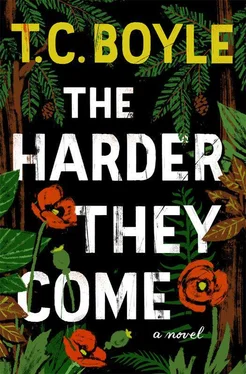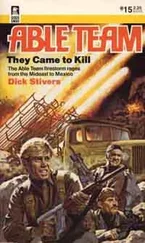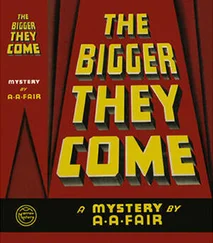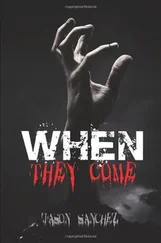Sten had been arrested only once in his life, for a DUI after a wedding for which he’d stood as best man. John Jarvis’ wedding. J.J. They’d been in the Corps together, had seen some hairy and not-so-hairy shit, buddies over there and back here, and when they got home — the very week — J.J. had married his high school heartthrob in some wedding palace down in Carmel. Drinking preceded the ceremony, floated through it on fumes and quick nips from one flask or another, rose in a delirious clamor while the cake was cut and distributed and went on unabated long after the newlyweds had ducked away to do what they were going to do as man and wife in their room at the big hotel in the middle of town. He’d felt a bit hazy as he’d climbed into his VW Bug and started back up the coast, alone and missing Carolee, who was away in London for her semester abroad, but he had the radio—“Radar Love,” cranked high, he remembered that, and “Magic Carpet Ride” too — and he had the window rolled down though he was freezing, making it all the way up 101 and Nineteenth Avenue through the city and Golden Gate Park and back onto the freeway and across the bridge, feeling clearer and soberer by the mile.
That was when the flashing lights appeared in his rearview, a cop rushing up on him so fast he thought at first the problem must have been up ahead of him somewhere, the cop after somebody else in that streaming river of taillights that made the night so cozy and inviting. He was wrong. The cruiser rode up on his tail, but he told himself that didn’t mean anything, not necessarily, because maybe the cop was going to get off at the exit coming up on the right, an emergency there somewhere, an accident, a dog loose on the highway, a motorcyclist down, debris in the passing lane. . but then the cruiser swung out alongside him and it began to dawn on him that he was in trouble.
What he remembered of that night, aside from the wheezing and muttering of his fellow drunks and the reek of vomit that was so pervasive it seemed to arise from the walls themselves, was the helplessness he’d felt behind bars, locked up, incarcerated, in the can, no place to turn or even sit, except the floor — not in control, definitely not in control. He’d told the arresting officer he’d been to a wedding, the wedding of one of his service buddies—“You know,” he said, “the Marine Corps? Like I served my country. Like I saw some bad shit and I know I had a couple drinks, just this once, because it was a wedding, okay?”—but it didn’t do any good. He had a flashlight, the cop, and it was right there like a supernova bursting in Sten’s face, in his eyes, hot and probing. Cars hissed by. It was the strangest thing, but for a moment, just that moment, he didn’t seem to know where he was or where the light had come from or why it was punishing him like this. “You know you’re in no condition to drive, don’t you?” the cop said.
Sten just blinked at him. And then, very slowly, he began to nod his head in agreement.
But now he was in a corridor, deep in the underbelly of the ship, one man on his left, the other on his right. They walked along amiably enough, down to the end of the corridor, and then they swung into another corridor and another after that till he had no idea where he was or how to find his way back. He followed their lead, moving along blindly till Salas put a hand on his arm to guide him and they entered a room that smelled of food — of hamburgers, a mountain of hamburgers, fries, onion rings, beer — and he saw the light there, bright as the cop’s flashlight, and the man it illuminated till it seemed as if he were the only three-dimensional thing in the room. Everything else was flattened as if on a screen, tables, chairs, the counter where they must have served up meals to the crew. But the man — a Tico in an oversized T-shirt sitting at one of the Formica tables, his hands cuffed behind his back and his eyes cast down — seemed to leap out at him. He wore a goatee. He was skinny, puny, barely there. He might once have held a knife in his hand.
“Is this the man that attacked you?” Salas indicated the prisoner with a jerk of his head, his voice in official mode now, ripe with accusation and contempt. “Or one of the men?”
Sten saw now that there was another policeman in the room, a guard with a holstered gun leaning against the back wall in the shadow — or relative shadow — of the lamp. He saw too that the lamp, one of those shop lights with a clamp at the base of it, was fixed to the table directly across from the prisoner and arranged so that there was no way for him to escape the glare of it, and if he went outside of himself again to think of the movies, this scene he’d witnessed a hundred times on screens big and small, it was because the movies were his only reference point for what was happening to him. It was as if he’d entered some dream, some fantasyland where there was no sun, no sky, no mud lot or bus or ship, only this. Finally — and he was on his guard now, on his guard all over again — he noticed the square of white cloth smoothed out at the far end of the table. It was a linen napkin, one of the service items on pristine display at each of the ship’s restaurants and lounges, one of countless thousands that must have been washed, dried, folded and set out afresh each day. But this one was different. This one held — presented — three exhibits: a.357 Magnum revolver and two knives, switchblades with mother-of-pearl handles.
“Well?” Salas said. “What do you say?”
Sten looked to Potamiamos but Potamiamos averted his eyes, as uneasy with the proceedings as he was himself. He could feel Salas pushing his will on him, eager to get this over with, wrap it up, take the prisoner back where he belonged, to the cell in some crumbling compound with the rusting steel bars and wet concrete floor — and what else? Roaches, there’d have to be roaches. Scorpions, maybe. Who knew? Biting flies. Leeches. Toss him in the pit and leave him there. Sten wanted out too. He thought of Carolee and the other cop and how she was bearing up, and then he was focusing on the prisoner as if seeing him for the first time. The man’s left eye was partially closed and a raised red welt traced the cheekbone beneath it. His scalp was close-shaved, each follicle of hair bristling like a clump of rice set down in a smooth paddy of skull-tight flesh. There was a problem with his ear, the lobe torn, dried blood coiled in the hollow there, grainy and dark, and his posture was all wrong, his body language. He looked ashamed of himself, looked guilty. Was this the man? Sten couldn’t say. It could be. Certainly it could be.
“Well?”
Sten shrugged.
Salas exchanged a glance with the Senior Second Officer. “We will need a positive identification, because unfortunately”—he gestured to the weapons on the white cloth—“whatever person extracted these knives from the mud compromised any fingerprints we might have found there. Do these look like the knives the perpetrators used — in your recollection?”
Another shrug. “I don’t know,” he said. “But that’s the gun.”
“Yes, we have corroborated that.”
It was then that the prisoner entered the equation, suddenly jerking to life as if he’d been hot-wired. His head snapped forward and he rucked something up — a rapid ratcheting of his throat, the pursing of his lips — and there it was on the front of Sten’s shirt, dangling in a long glistening thread. “ Voy a matarle, ” he snarled, even as Salas stepped forward and cuffed the side of his face. “ ¡Silencio! ” Salas roared, and then he turned to Sten and said, “Do you see? Do you see what happens when you try to treat these animals like human beings?” He drew himself up. The prisoner shrank back into the nest of his bones. The light flickered and the bloated hull of the ship seemed to rise and dip on a nonexistent tide.
Читать дальше












